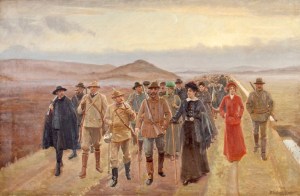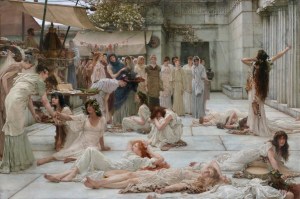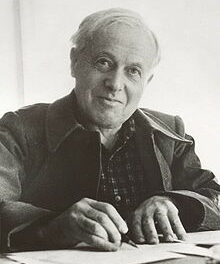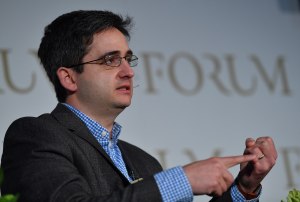We support our Publishers and Content Creators. You can view this story on their website by CLICKING HERE.
Even in the midst of circumstances we consider less than ideal—a degraded and hostile culture, broken families—the Spirit of the Lord works so that we are not alone. He raises up children of the Father who want to be conformed to the Son in their own lives and to witness to the truth. They are working in ordinary jobs and living ordinary lives from the world’s perspective. But when we dig a bit deeper, we will find that something extraordinary is going on.
 It is easy to be down about the state of the Church and our culture today. Saying things are secularized doesn’t seem quite right. Today all sorts of ideas about what human life and happiness mean are presented to us as dogmas. Or perhaps counter-dogmas, since they are negations of Divine Revelation and, quite often, of reason itself.
It is easy to be down about the state of the Church and our culture today. Saying things are secularized doesn’t seem quite right. Today all sorts of ideas about what human life and happiness mean are presented to us as dogmas. Or perhaps counter-dogmas, since they are negations of Divine Revelation and, quite often, of reason itself.
A lot of people seem to be listening to those ideas and, if not affirming them wholeheartedly, accepting them with a shrug. While some priests and bishops speak and act on the truth heroically, too many are uncertain trumpets at best. The statistics for American Catholics show the same decline as mainline Protestants—fewer ordinations, marriages, baptisms, and people in the pews for weekly Mass. For many of us, these are more than statistics. Our siblings, our children, our friends, our former students, even perhaps our parents may well be wandering far from the Lord now.
We can feel alone, and we can feel depressed about it. Maybe the words of our Lord that resonate most with us are in his question to the Disciples in Luke 18:8: “When the Son of Man comes, will he find faith on the earth?” Perhaps we feel like the Prophet Elijah suffering under the persecution of Queen Jezebel: “I have been very jealous for the Lord, the God of hosts; for the people of Israel have forsaken thy covenant, thrown down thy altars, and slain thy prophets with the sword; and I, even I only, am left; and they seek my life, to take it away” (I Kings 19:8).
I certainly feel this way sometimes, but a recent phone call made me think of what Elijah heard in response to his complaint. God did not promise that things would be instantly better, but he did tell Elijah that he would have a successor as prophet—the young Elisha—and assured him that he would “leave seven thousand in Israel, all the knees that have not bowed to Ba′al, and every mouth that has not kissed him” (I Kings 19:18). I heard God’s voice saying something similar to me.
The call itself was not to a revered teacher or priest. It was one of those planned calls with a guy helping me take care of some details regarding my retirement plan. It was supposed to take fifteen to twenty minutes at most, but I ended up talking to the young man for about a half hour before we even got to the business.
We had exchanged small talk about my work. When I told him about teaching theology, he was very interested. What kinds of things did I teach? Did I teach seminarians? Did I know anything about the Theology of the Body? What kind of spiritual reading is good to do? None of this had to do with the business we had planned to do, but it was the business of life, in fact eternal life, that animated him. Ordinarily, I like to keep these kinds of calls as short as possible, but I had no thoughts of cutting him off.
What had really gotten him going was when I said that I have taught candidates for the permanent diaconate and their wives. He and his girlfriend are trying to decide if they should get married. He has always wanted to serve Christ and the Church, but he also feels a call to marriage. Thus he was really interested in talking about both marriage and ministry. What does Catholic marriage look like? What are the difficulties involved? What is the formation like for permanent deacons? What’s the process for discerning?
As we talked about marriage, I asked if he and his possibly-soon-to-be fiancée had good models for marriage in their own parents. That was one of the concerns. Her parents were divorced, and he was raised by a single mother. This is a situation that is not uncommon these days. His worries were indeed good ones to have. My advice was to find and befriend some married couples who were practicing their faith seriously. You can get only so much from reading and from calls from clients. Most of us need to see how good marriages work and imitate them.
We did finally get around to doing the financial business that was the reason for the call in the first place. But the conversation has stuck with me over the last few weeks. We have corresponded once or twice via email and text since then. He is serious about thinking about what the Lord wants him to be doing. And I have been praying that the Lord would show him exactly that.
It was a refreshing reminder that even in the midst of circumstances we consider less than ideal—a degraded and hostile culture, broken families—the Spirit of the Lord works so that we are not alone. He raises up children of the Father who want to be conformed to the Son in their own lives and to witness to the truth. They are working in ordinary jobs and living ordinary lives from the world’s perspective. But when we dig a bit deeper, perhaps even just mention our own faith, we will find that something extraordinary is going on.
Even in the darkest of times, the Kingdom of God is in our midst. There are people faithful to it, knees that have not bowed to Ba’al, and mouths that have not kissed him. The question for us is whether we have eyes to see and ears to hear this Kingdom and are able to identify its faithful people, our brother and sister saints in the making. And we will know that we are far from alone.
Republished with gracious permission from The Catholic Servant.
This essay was first published here in August 2023.
The Imaginative Conservative applies the principle of appreciation to the discussion of culture and politics—we approach dialogue with magnanimity rather than with mere civility. Will you help us remain a refreshing oasis in the increasingly contentious arena of modern discourse? Please consider donating now.
The featured image is “After the last battue” (1905) by Michael Peter Ancher, and is in the public domain, courtesy of Wikimedia Commons.
Share This Story, Choose Your Platform!
Go to Top

 Conservative
Conservative  Search
Search Trending
Trending Current News
Current News 






